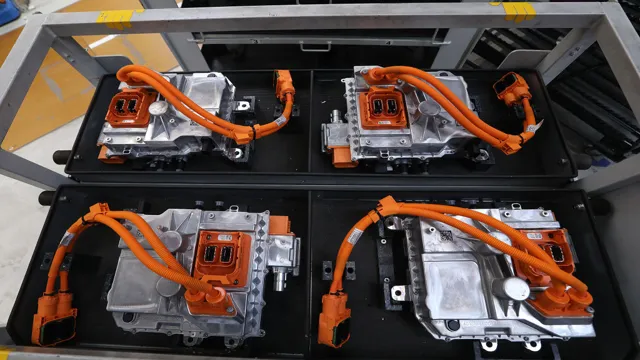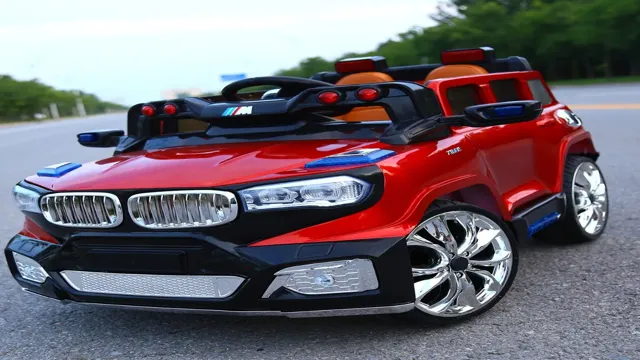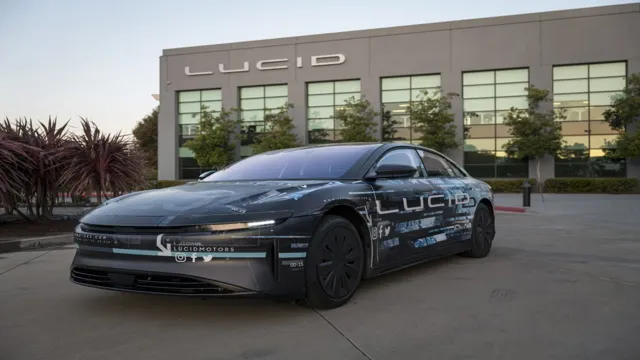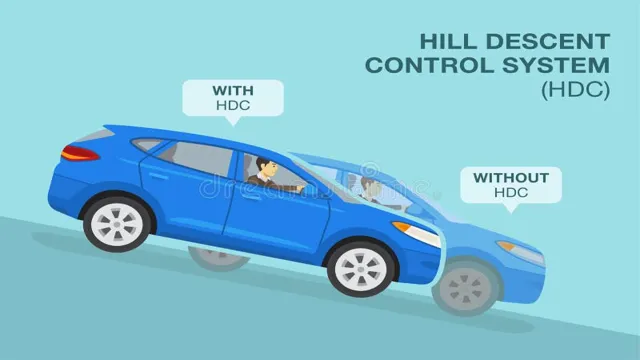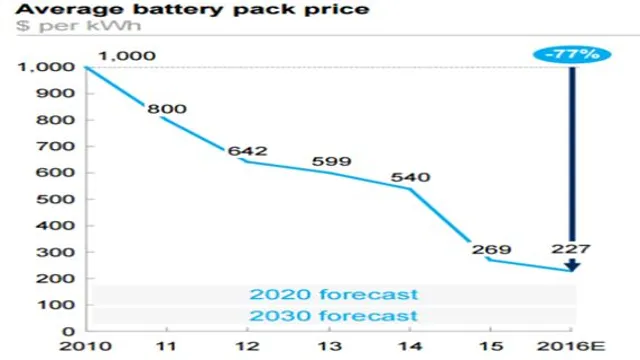Dive Into The Dynamic World of EV Batteries: Understanding The Differences Between Electric Car Batteries
Have you ever wondered about the differences between various electric car batteries? With so many models on the market, it can be difficult to understand the advantages and disadvantages of each type. Not all batteries are created equal, and it’s important to know what sets them apart from each other. Electric car batteries come in different chemistries, materials, and designs, which affect their performance, range, cost, and environmental impact.
Some of the most common battery types include nickel-metal hydride (NiMH), lithium-ion (Li-ion), and solid-state batteries. Each has its own trade-offs and trade-ups, depending on factors such as energy density, cycle life, safety, scalability, and price. For instance, NiMH batteries are known for their reliability, low cost, and ability to handle high currents.
However, they are heavier and bulkier than Li-ion batteries, have lower energy density and shorter lifespan, and contain toxic metals. On the other hand, Li-ion batteries are lighter, more compact, and more energy-efficient than NiMH batteries, and can be designed for fast charging and discharging. However, they are more expensive, have limited cycle life, and are prone to thermal runaway and flammability.
Solid-state batteries are a newer technology that promises even greater energy density, safety, and longevity than Li-ion batteries. They use a solid electrolyte instead of a liquid or gel electrolyte, which eliminates the need for a separator and reduces the risk of leakage, fire, or explosion. However, they are still in the development stage and have yet to overcome challenges such as cost, scalability, and durability.
Understanding the differences between electric car batteries can help you make informed decisions when buying, using, and recycling electric vehicles. Whether you prioritize affordability, performance, or sustainability, there is a battery type that suits your needs and values. Stay tuned to learn more about the pros and cons of each type and how they fit into the future of mobility.
Battery Chemistry
As electric cars become increasingly popular, it’s important to understand the differences between the different types of batteries used to power them. One key difference is the type of chemistry used in the battery. Lithium-ion batteries are the most common type of battery used in electric cars, and they work by using a chemical reaction to move electrons between two electrodes.
Another type of battery is the lead-acid battery, which is cheaper but not as efficient as lithium-ion batteries. Other types of batteries include nickel-metal hydride, which is less common but can provide longer range than lithium-ion batteries. The type of battery used in an electric car can have a big impact on its performance, range, and cost, so it’s important to choose the right one for your needs.
Lithium-ion vs. Nickel-metal Hydride
When it comes to choosing between Lithium-ion and Nickel-metal Hydride batteries, battery chemistry plays a crucial role. Lithium-ion batteries are widely used nowadays due to their high energy density, long lifespan, and low self-discharge rate, making them ideal for portable electronic devices. On the other hand, Nickel-metal Hydride batteries are well-known for their affordability, ease of disposal, and are commonly used in toys and remote-controlled devices.
However, Lithium-ion batteries have an edge over Nickel-metal Hydride batteries when it comes to performance and efficiency. They are much lighter and have a higher capacity compared to Nickel-metal Hydride batteries. This makes Lithium-ion batteries a more suitable option for energy-hungry applications like electric cars and power tools.
Nonetheless, it’s essential to choose the right battery for your specific use case and make an informed choice based on your needs. So, consider the pros and cons of both battery types before making a decision.
Advantages and disadvantages of each type
When it comes to battery chemistry, there are several advantages and disadvantages to each type. Lead-acid batteries are typically inexpensive and reliable, making them a popular choice for car batteries. However, they are heavy and require maintenance to ensure they last for an extended period.
Lithium-ion batteries, on the other hand, are lightweight and have a higher energy density, making them the preferred choice for many electronic devices. They also require less maintenance and have a longer lifespan. However, they can be susceptible to overheating and require careful handling to prevent damage or even explosions.
Nickel-cadmium batteries are reliable and have a long lifespan, but they are becoming less common due to their toxicity and environmental impact. Each battery chemistry has its benefits and drawbacks, so it’s important to consider your needs and usage before making a decision.
Battery Capacity
One of the key differences between electric car batteries is their capacity. Battery capacity refers to the amount of energy the battery can store and provide to power the vehicle. Different electric cars have different battery capacities, which ultimately affect the car’s driving range.
Some electric cars can travel more than 400 miles on a single charge, while others can only go about 100 miles. This difference in battery capacity is a result of different battery chemistries and constructions used in the manufacturing process. The larger the battery, the more expensive the car tends to be, but it also provides a longer driving range.
When choosing an electric car, it’s important to consider your daily driving habits and how much range you require to avoid running out of power while on the go.
Kilowatt-hour Measurement
Battery Capacity When it comes to measuring the energy capacity of a battery, the most common term you’ll hear is kilowatt-hour (kWh). This unit of measurement represents the amount of energy a battery can store and deliver. In simple terms, if a battery has a capacity of 1 kWh, it can supply 1,000 watts of power for one hour or 100 watts of power for ten hours.
This is a crucial factor to consider when choosing a battery for your home, car, or other device. The higher the battery capacity, the more energy it can store, which means you can use it for longer periods without needing to recharge it. But, it’s important to note that battery capacity is not the only factor to consider when choosing a battery.
The type of battery, its voltage, and its rate of discharge all play a significant role in how much energy it can deliver. For example, a Lithium-ion battery with a 1 kWh capacity might have a higher rate of discharge than a Lead-acid battery with the same capacity. This means that the Lithium-ion battery can deliver more power over a shorter period.
So, when choosing a battery, it’s important to consider not only its capacity but also its discharge rate and type. This will help ensure that you select a battery that suits your power needs and offers the best performance. Remember, the right battery can provide you with reliable and long-lasting power, so it’s worth taking the time to choose wisely.
Range and Performance Differences
When comparing electric cars, the battery capacity is a crucial factor that determines the range and performance differences among them. The battery capacity is measured in kWh or kilowatt-hours, which represents the amount of energy stored in the battery. Generally, the higher the battery capacity, the longer the range of the car.
Some of the high-end electric cars have a battery capacity of over 100 kWh, providing a range of up to 400 miles on a single charge. However, the battery capacity also affects the car’s performance, such as acceleration, speed, and overall power delivery. Electric cars with larger batteries tend to be faster and more powerful but can also be heavier, affecting the car’s handling and agility.
Therefore, finding the right balance between battery capacity and performance is crucial in designing the optimal electric cars.
Charging Time
When it comes to electric cars, one factor that separates them from traditional gasoline-powered vehicles is their battery system. There can be a significant difference between electric car batteries, particularly in charging time. Some electric cars can recharge in as little as 30 minutes, while others may take several hours.
The charging time largely depends on the battery’s size and type, as well as the charging method used. For instance, using a Level 2 charger can take up to 8 hours to fully charge some electric car batteries. On the other hand, a Level 3 charger, also known as a DC fast charger, can provide up to an 80% charge in less than 30 minutes.
It is essential to consider the charging time when purchasing an electric car, as it can greatly affect your daily routine, especially if you rely on your vehicle for work or travel.
Semi-fast vs. Fast-charging
When it comes to charging your batteries, you have two primary options: semi-fast and fast charging. The main difference between the two is the time it takes to fully charge your battery. Semi-fast charging typically takes anywhere from 30 minutes to an hour, whereas fast charging can fully charge your battery in as little as 15 minutes.
However, it’s important to note that fast charging can be more taxing on your battery and may shorten its overall lifespan. Additionally, not all devices are compatible with fast charging, so it’s important to check your device’s specifications before opting for this option. Ultimately, the choice between semi-fast and fast charging depends on your individual needs and preferences.
If you’re in a rush and need a quick charge, fast charging may be the best option for you. But, if you have the time and want to use a charging method that’s less likely to damage your battery, semi-fast charging may be the way to go. No matter which option you choose, make sure you’re using a high-quality charger and following proper charging practices to ensure the longevity and health of your battery.
DC vs. AC Charging
When it comes to EV charging, many owners are often torn between DC and AC charging. While both options can charge your vehicle, one factor that an EV owner should consider is the time it takes to charge the vehicle. Generally, DC charging is faster than AC charging, especially when you’re in a hurry.
With a DC fast charger, you can usually get up to 80% charge in just under an hour. On the other hand, AC charging may take several hours to fully charge your vehicle, depending on your plug-in point’s power output and your vehicle’s battery size. Therefore, if you are planning a long trip with no much time, DC charging is the best option.
However, if you have plenty of time, AC charging may be a viable option. Keep in mind, when comparing DC and AC charging, your vehicle’s battery size, charger type, and power output affect charging time.
Battery Lifespan
The biggest difference between electric car batteries is the lifespan of the battery. The lifespan of an electric car battery depends on a variety of factors, including how the battery is used, the temperature and humidity of the environment, and the quality of the battery itself. Higher-quality batteries typically have longer lifespans, but can be more expensive.
On the other hand, lower-quality batteries are often cheaper, but may have a shorter lifespan. It’s important to consider these factors when choosing an electric car, as the lifespan of the battery will have a significant impact on the overall lifespan of the car. Additionally, it’s important to properly maintain the battery over its lifespan, following the manufacturer’s recommended procedures for charging and maintenance.
With proper care, an electric car battery can last for many years, providing reliable and efficient transportation for the owner.
Factors that Affect Battery Life
One of the most important aspects to consider when purchasing a device that uses a battery is its lifespan. The lifespan of a battery can vary depending on several factors, including usage patterns, temperature, and the type of battery chemistry. For example, frequent charging and discharging of a lithium-ion battery can reduce its lifespan, while keeping the battery at high temperatures can cause it to degrade more quickly.
Additionally, certain battery chemistries, like nickel-cadmium, can experience what is known as the memory effect, which reduces their ability to hold a full charge over time. As a consumer, it is essential to understand these factors and take appropriate steps to prolong the lifespan of your device’s battery, such as avoiding extreme temperatures, charging the device at the appropriate times, and using the correct charger. By taking these precautions, you can ensure that your device operates optimally and has a long-lasting battery that will serve you well for years to come.
Conclusion
While it may seem like all electric car batteries are the same, the truth is that there are subtle (and not-so-subtle) differences that can greatly impact the performance and cost of the vehicle. Just like choosing a wine, one must take into consideration the type of battery, the range, the charging time, and of course, the price. So, whether you’re a connoisseur of electric cars or just looking for a reliable and cost-effective alternative to traditional gas guzzlers, it’s important to do your research before making a purchase.
“
FAQs
What is the difference between Lithium-ion and Lead-acid batteries used in electric cars?
Lithium-ion batteries are lighter and provide longer range compared to lead-acid batteries used in electric cars. They also have a longer cycle life and require less maintenance.
How do Nickel Metal Hydride (NiMH) car batteries compare to Lithium-ion batteries in electric cars?
NiMH batteries are heavier and bulkier compared to Lithium-ion batteries, which can affect the driving range and interior space. However, they are more cost-effective and easier to recycle.
What advantages do Solid-state batteries have over traditional Lithium-ion batteries in electric cars?
Solid-state batteries have a higher energy density, allowing for longer driving ranges and faster charging times. They are also safer, with a lower risk of thermal runaway or fire.
Can I replace the battery in my electric car with a different type of battery?
It is not recommended to replace the original battery in an electric car with a different type of battery, as it may affect the performance and safety of the vehicle. It is best to consult with the manufacturer or a licensed technician for any battery replacement needs.

